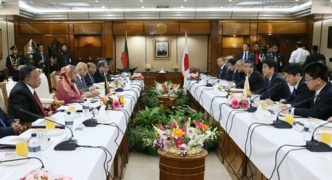Japan-Bangladesh Relations
Japan-Bangladesh Summit Meeting
 Photo: Cabinet Public Relations Office
Photo: Cabinet Public Relations Office
Prime Minister Shinzo Abe held a summit meeting with H.E. Sheikh Hasina, Prime Minister of the People's Republic of Bangladesh, on September 6, from 4:00 p.m. to 5:00 p.m. The overview of the meeting is as follows:
1.Opening
At the beginning, Prime Minister Hasina welcomed Prime Minister Abe's visit to Bangladesh and expressed her expectation for the enhancement of the relationship between Japan and Bangladesh. In response, Prime Minister Abe mentioned that it is his pleasure to visit Bangladesh, which is rapidly developing, and he would like to steadily develop the "Japan-Bangladesh Comprehensive Partnership" established last May. Prime Minister Abe said that he hopes democracy will be further promoted in Bangladesh.
2.Political and security issues
Prime Minister Abe appreciated Bangladesh's contribution to the international community through Peacekeeping Operations (PKO) and welcomed the progress in the cooperation toward the training of PKO personnel by Japan. In response, Prime Minister Hasina stated that Japan and Bangladesh share various interests and she would like to cooperate with Japan in the fields of anti-terrorism and PKO. Prime Minister Hasina mentioned that she hopes to realize a foreign secretary level consultation next year to advance dialogue between the two countries.
3.Economy and economic cooperation
- (1) Prime Minister Abe explained the concept of "Bay of Bengal Industrial Growth Belt (BIG-B)" as an initiative to aim at cooperation in infrastructural development, the improvement of investment environment and regional connectivity. He mentioned that he would like to materialize the concept by strengthening economic policy dialogue. Prime Minister Hasina stated that the past assistance from Japan has greatly contributed to the social/economic development of Bangladesh and the BIG-B would contribute to the industrial development in Bangladesh.
- (2) Concerning economic relations, Prime Minister Abe said that developing infrastructure and improving energy supply and investment environment are essential for the promotion of the entry of Japanese companies into Bangladesh and expressed his hope for Prime Minister Hasina's initiative in this regard. Prime Minister Hasina said that Bangladesh is an emerging country with increasing number of foreign companies moving in and expressed her hope for more entry of Japanese companies to Bangladesh. Prime Minister Hasina also said that she would put efforts for ensuring a better business environment.
4.People-to-people and cultural exchanges
Prime Minister Abe explained that the Government of Japan has been implementing policies to realize a society in which women shine. Moreover, Prime Minister Abe conveyed his intention to promote Japanese studies in Bangladesh in cooperation with the Japan Study Center of Dhaka University. Prime Minister Hasina mentioned that Dr. Shirin Sharmin Chaudhury, the Speaker of Bangladesh Parliament, would participate in the World Assembly for Women in Tokyo (WAW! Tokyo 2014) in September.
5.Election of the non-permanent members of United Nations Security Council in 2015
Touching upon the fact that Japan and Bangladesh have historically enjoyed a very friendly relationship since the independence of Bangladesh, Prime Minister Hasina said that Bangladesh would support Japan's candidature and withdraw its candidature for the election of the non-permanent members of United Nations Security Council in 2015 for the sake of the further enhancement of the bilateral relationship. Prime Minister Abe expressed his deep gratitude for the decision and highly appreciated it. Prime Minister Abe also stated that this bold decision elevates the Japan-Bangladesh relationship to a higher level and he would like to further strengthen cooperation with Bangladesh in the international arena.


 (101KB)
(101KB)